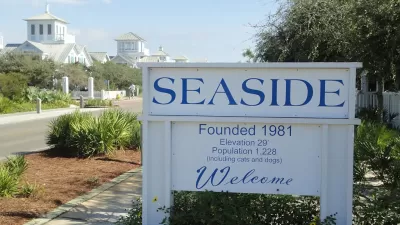The critically lauded Plan El Paso hasn’t yet spurred the kind of urban revitalization it was designed to achieve. Some say its evidence that people still want sprawl, other say changes are still coming.
Alana Samuels takes a deep look at El Paso's current state, after years of progressive planning initiatives and political controversies have moved the direction of the city between conflicting visions.
First Samuels notes the award-winning pedigree of the city's planning efforts over the course of the decade: "The National Resources Defense Council has said that El Paso has 'America’s Best Smart Growth Plan' and—perhaps more surprisingly—in 2011 the city won a Smart Growth award for its Plan El Paso, a 800-plus page comprehensive plan that aimed to make the city more compact, walkable, and transit-friendly."
Despite all the awards, Samuels takes a critical look at the results of the 2012 Plan El Paso that attracted all the attention, noting a very slow adoption of the densisity and mixed-use focus of the goals set forth by the plan, while sprawling developments continue on the periphery of the city. El Paso's reluctance to adopt more urban principals, according to Samuels, raises the question: "Does El Paso, or indeed, the Southwest, really want to make a shift to more walkable neighborhoods and apartment-style buildings?"
Samuels details the political debate and planning initiatives that preceded the adoption of Plan El Paso, in addition to the political fallout for some of the plan's lead proponents. Sameuls also details the projects that have developed in the city since the adoption of the plan, as well as the plan's many visions that are still unfulfilled.
FULL STORY: El Paso Is Learning That Not Everyone Hates Sprawl

Maui's Vacation Rental Debate Turns Ugly
Verbal attacks, misinformation campaigns and fistfights plague a high-stakes debate to convert thousands of vacation rentals into long-term housing.

Planetizen Federal Action Tracker
A weekly monitor of how Trump’s orders and actions are impacting planners and planning in America.

In Urban Planning, AI Prompting Could be the New Design Thinking
Creativity has long been key to great urban design. What if we see AI as our new creative partner?

King County Supportive Housing Program Offers Hope for Unhoused Residents
The county is taking a ‘Housing First’ approach that prioritizes getting people into housing, then offering wraparound supportive services.

Researchers Use AI to Get Clearer Picture of US Housing
Analysts are using artificial intelligence to supercharge their research by allowing them to comb through data faster. Though these AI tools can be error prone, they save time and housing researchers are optimistic about the future.

Making Shared Micromobility More Inclusive
Cities and shared mobility system operators can do more to include people with disabilities in planning and operations, per a new report.
Urban Design for Planners 1: Software Tools
This six-course series explores essential urban design concepts using open source software and equips planners with the tools they need to participate fully in the urban design process.
Planning for Universal Design
Learn the tools for implementing Universal Design in planning regulations.
planning NEXT
Appalachian Highlands Housing Partners
Mpact (founded as Rail~Volution)
City of Camden Redevelopment Agency
City of Astoria
City of Portland
City of Laramie




























